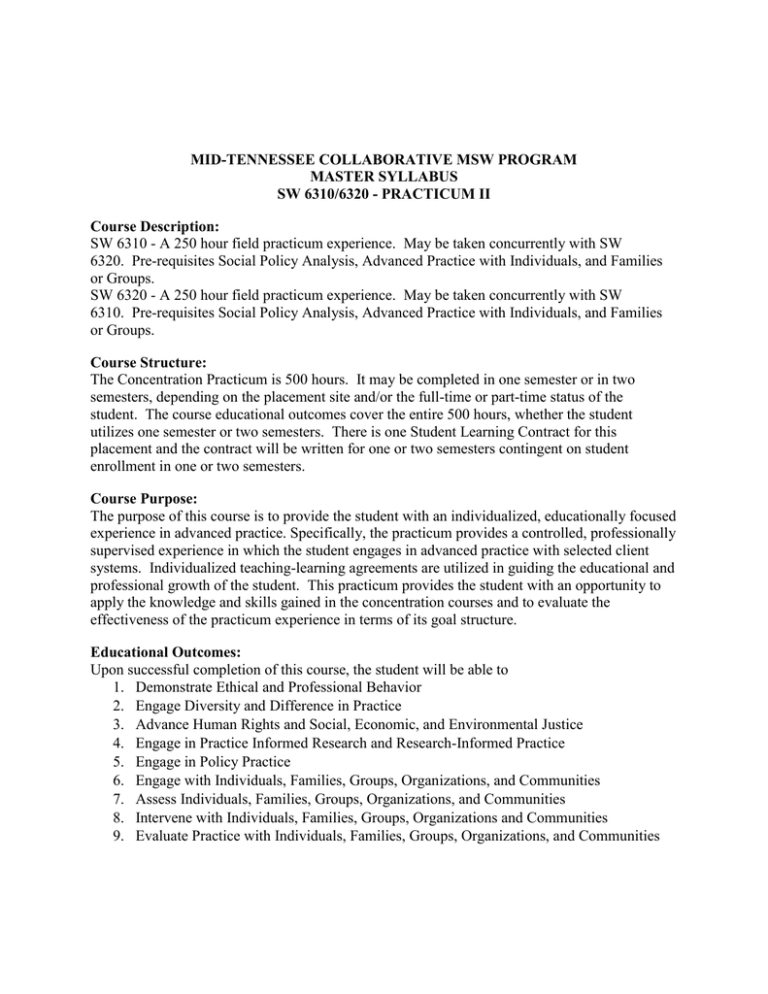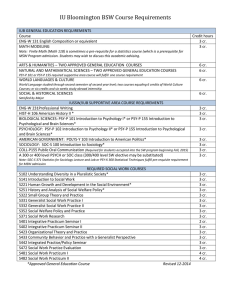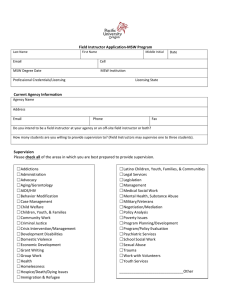6320 Practicum I master with contract 2015
advertisement

MID-TENNESSEE COLLABORATIVE MSW PROGRAM MASTER SYLLABUS SW 6310/6320 - PRACTICUM II Course Description: SW 6310 - A 250 hour field practicum experience. May be taken concurrently with SW 6320. Pre-requisites Social Policy Analysis, Advanced Practice with Individuals, and Families or Groups. SW 6320 - A 250 hour field practicum experience. May be taken concurrently with SW 6310. Pre-requisites Social Policy Analysis, Advanced Practice with Individuals, and Families or Groups. Course Structure: The Concentration Practicum is 500 hours. It may be completed in one semester or in two semesters, depending on the placement site and/or the full-time or part-time status of the student. The course educational outcomes cover the entire 500 hours, whether the student utilizes one semester or two semesters. There is one Student Learning Contract for this placement and the contract will be written for one or two semesters contingent on student enrollment in one or two semesters. Course Purpose: The purpose of this course is to provide the student with an individualized, educationally focused experience in advanced practice. Specifically, the practicum provides a controlled, professionally supervised experience in which the student engages in advanced practice with selected client systems. Individualized teaching-learning agreements are utilized in guiding the educational and professional growth of the student. This practicum provides the student with an opportunity to apply the knowledge and skills gained in the concentration courses and to evaluate the effectiveness of the practicum experience in terms of its goal structure. Educational Outcomes: Upon successful completion of this course, the student will be able to 1. Demonstrate Ethical and Professional Behavior 2. Engage Diversity and Difference in Practice 3. Advance Human Rights and Social, Economic, and Environmental Justice 4. Engage in Practice Informed Research and Research-Informed Practice 5. Engage in Policy Practice 6. Engage with Individuals, Families, Groups, Organizations, and Communities 7. Assess Individuals, Families, Groups, Organizations, and Communities 8. Intervene with Individuals, Families, Groups, Organizations and Communities 9. Evaluate Practice with Individuals, Families, Groups, Organizations, and Communities Course Content: I. Practicum Orientation II. Practicum Planning and Placement III. Completion of Learning Contract IV. Appropriate Use of Supervision in Advanced Generalist Practice V. Evaluation Texts: Mid-Tennessee Collaborative MSW Program Practicum Manual (available online) National Association of Social Workers (1997). Code of ethics. NASW Press. Class Grading: Pass/Fail Recommended Class Assignments: Learning Contract: Complete a Learning Contract based on the educational outcomes for this course. The learning contract shall include all assignments and activities (goals and objectives) and completion time frames expected of the student during the practicum. It is to be developed by the student in collaboration with the field instructor at the field placement agency. The Learning Contract must be ready for review with the student and field instructor during each meeting with the field liaison. Journal: Maintain a log of daily work activities. Logs must document: Ability to select an intervention strategy appropriate to the assessment, consistent with clients' needs, and taking into account the agency and cultural contexts Implementation of the intervention strategy demonstrating mastery of the intervention techniques, disciplined use of self, facilitative relationships with the client, and responsiveness to the ramifications of the intervention effort for non-focal aspects of the client and agency systems Assessment of the impact of interventions undertaken, including any corrective adjustments in assessments, intervention plans or skill utilization Articulation of an integrative assessment of the interaction between various factors affecting service delivery, including agency realities, dynamics of the client system and the relative cultural context, in such a way as to represent a personalized understanding of social work practice within the practicum agency Evaluation of one's own professional efficacy and utilization of current knowledge and skills Ability to relate effectively to supervisors and colleagues in order to deliver social services effectively, and monitor and assess the efficacy of practice Identification of the roles and responsibility of the practitioner in providing information to policy makers on the impact of policies and the effective provision of agency services Final Evaluation: This evaluation serves as a tool to measure the student’s progress towards displaying the core competencies in practice at the final stages of the placement. Competencies and Behaviors Measurement Demonstrate Ethical and Professional Behavior Learning Contract, Journals, Final Evaluation Engage Diversity and Difference in Practice Learning Contract, Journals, Final Evaluation Advance Human Rights and Social, Economic, and Environmental Justice Learning Contract, Journals, Final Evaluation Engage in Practice informed Research and Research-Informed practice Learning Contract, Journals, Final Evaluation Engage in policy practice Learning Contract, Journals, Final Evaluation Engage with Individuals, Families, Groups, Organizations and Communities Learning Contract, Journals, Final Evaluation Assess Individuals, Families, Groups, Organizations and Communities Learning Contract, Journals, Final Evaluation Intervene with Individuals, Families, Groups, Organizations and Communities Learning Contract, Journals, Final Evaluation Evaluate Practice with Individuals, Families, Groups, Organizations and Communities Learning Contract, Journals, Final Evaluation Bibliography: Armour, M., Bain, B., & Rubio, R. (2004). An evaluation study of diversity training for field instructors: A collaborative approach to enhancing cultural competence. Journal of Social Work Education, 40, 27-37. Baer, J. (2001). Evaluating practice: Assessment of the therapeutic process. Journal of Social Work Education, 37,127-136. Bobo, M., Regeher, C., Power, R., Hughes, J., Woodford, M., & Regehr. G. (2004). Toward new approaches for evaluating student field performance: Tapping the impact criteria used by experienced field instructors. Journal of social Work Education, 40, 417-425. Bogo, M., Bloberman, J., & Sussman, (2004). The field instructor as group worker: Managing trust and competition in group supervision. Journal of Social Work Education, 40, 13-26. Birkenmaier, J., & Berg-Weger, M. (2007). The practicum companion for social work: Integrating class and field work (2nd ed.). Boston: Allyn & Bacon. Brooks, D., & Goldberg, S. (2001). Gay and lesbian adoptive and foster care placements: Can they meet the needs of waiting children? Social Work, 46, 147-157. Chapin-Russell, L., & Ivey, A. (2004). Your supervised practicum and internship: field resources for turning theory into action. Belmont, CA: Brooks/Cole. Cochrane, S., & Hanley, M. (1999). Learning through field: A developmental approach. Boston: Allyn & Bacon. Cournoyer, B., & Stanley, M. (2002). The social work portfolio: Planning, assessing, and documenting lifelong learning in a dynamic profession. Belmont, CA: Brooks/Cole. Danowski, W. (2005). In the field: A real-life survival guide for the social work internship. Boston: Allyn & Bacon. Deal, K., & Clements, J. (2006). Supervising students developmentally: Evaluating a seminar for new field instructors. Journal of Social Work Education, 42, 291-305. Edmond, T., Megivern, D., Williams, C., Rochman, E., & Howard, M. (2006). Journal of Social Work Education, 42, 377-396. Esqueda, M.; Cederbaum, J.A.; Malchi, K.; Pineda, D.M.; Benbenishty, R.; Astor, R.A.. (2014). MSW students' experience with termination: Implications and suggestions for classroom and field instruction. Children & Schools, 36(1), 41-50. Garthwait, C. (2008). The social work practicum: A guide and workbook for students (4th ed.). Boston: Allyn & Bacon. Gelman, C.R.. (2009). MSW students' experience with termination: Implications and suggestions for classroom and field instruction. Journal of Teaching in Social Work, 29(2), 169-187. Gillis, H., & Lewis, J. (2004). Addressing the issue of psychiatric disability in social work interns: The need for a problem-solving framework. Journal of Social Work Education, 40, 391-402. Goodman, H.; Knight, C.; Khudododov, K. (2014). Graduate social work students' experiences with group work in the field and the classroom. Journal of Teaching in Social Work, 34(1), 60-78. Gutierrez, L., Yeakley, A., & Ortega. (2000). Educating students for social work with Latinos: Issues for the new millennium. Journal of Social Work Education, 36, 541-560. Johnston-Goodstar, K.. (2012). A funny thing happened at the internship today: A reflection on ethical dilemmas, decision-making, and consequences of a questionable field work situation. Reflections: Narratives of Professional Helping,18(2), 60-63. Lam, D. (2004). Problem-based learning: An integration of theory and field. Journal of Social Work Education, 40, 371-389. Limb, G., & Organista, K. (2003). Comparisons between Caucasian students, students of color, and American Indian students on their views on social work's traditional mission, career motivations, and practice preferences. Journal of Social Work Education, 39, 91-109. Rothman, J.C. (2000). Stepping out into the Field: A field work manual for social work students. Boston: Allyn & Bacon. Royse, D., Dhooper, S. S., & Rompf, E. (2007). Field instruction: A guide for social work students (5th ed.). Boston: Allyn & Bacon. Ryan, M., McCormack, J., & Cleak, H. (2006). Student performance in field education placements: The findings of a 6-year Australian study of admissions data. Journal of Social Work Education, 42, 67-83. Wayne, R. (2004). Legal guidelines for dismissing students because of poor performance in the field. Journal of Social Work Education, 40, 403-414. Wayne, J., Bogo, M., & Raskin, M. (2006). The need for radical change in field education. Journal of Social Work Education, 42, 161-169. MID-TENNESSEE COLLABORATIVE MASTER OF SOCIAL WORK (MTC-MSW) PROGRAM ADVANCED GENERALIST CONCENTRATION FIELD EDUCATION LEARNING CONTRACT & EVALUATION Student: ______________________________________________ Semester: ______________________________________ Field Instructor: ________________________________________ Faculty Liaison: __________________________________ Agency: _______________________________________________________________________________________ Agency Address: ____________________________________________________________________________________________ Phone/Email of Agency/Field Instructor: ________________________________________________________________________ _ This document will serve as the Educational Contract and the Evaluation for MTC-MSW students who are enrolled in the concentration practicum. The competencies shown are the competencies that are to be met by all students completing the MSW advanced generalist concentration curriculum. The students, working with the Field Instructor, will complete the educational contract by listing learning tasks for each behavior accomplished by the student at the practicum site during the placement. The particular Tasks identified are dependent on the setting and the population. The Faculty Field Liaison must approve the educational contract. The Field Instructor should ensure that the tasks on the educational contract are appropriate for concentration-level MSW students working under supervision. The educational contract can be modified based on the student’s mastery of the learning tasks, with new tasks being added. Evaluation of student activity is based on competency development. Please inform the Faculty Field Liaison of modifications made to the educational contract. The Field Instructor will evaluate the student at mid-term and at the end of the semester using the following scale: 5= Professional level activity, equivalent to employee 4= Competent level activity, with indirect supervision 3= Meets expectations, with direct supervision 2= Beginning level activity only 1= Attempted but failed to engage in this task N/A= List task deferred at this time Final Rating Scale: 5= Professional level activity, equivalent to employee 4= Competent level activity, with indirect supervision 3= Meets expectations, with direct supervision 2= Beginning level activity only 1= Attempted but failed to engage in this task N/A= List task deferred at this time Competency 1) Demonstrate Ethical and Professional Behavior Behavior Midterm Rating a) Identifies as a social work professional a) Understands & identifies professional strengths, limitations, & challenges b) Effectively uses reflection, self-correction, supervision & consultation to evaluate and enhance professional practice c) Apply ethical decision making skills to ussies specific to advanced generalist practice 2) Engage Diversity and Difference in Practice Competency Overall Score a) Apply & communicate diversity & difference in advanced generalist practice b) Engage with and ensure participation of diverse and marginalized clients and constituencies c) Identify and use practitioner/client/constituent differences from a strengths perspective Competency Overall Score Final Rating Final Rating Scale: 5= Professional level activity, equivalent to employee 4= Competent level activity, with indirect supervision 3= Meets expectations, with direct supervision Competency 3) Advance Human Rights and Social and Economic Justice 2= Beginning level activity only 1= Attempted but failed to engage in this task N/A= List task deferred at this time Behavior Midterm Rating a) Use knowledge of the effects of oppression, discrimination, and historical trauma on clients and constituents to guide planning and intervention b) Participate in practices that advance Social, Economic, & Environmental Justice in advanced generalist practice Competency Overall Score 4) Engage in PracticeInformed Research and ResearchInformed Practice a) Use research methodology to evaluate advanced generalist practice effectiveness and outcomes b) Participate in the generation of new knowledge through research and advanced generalist practice 5) Engage in Policy Practice Competency Overall Score a) Advocate to stakeholders the implications of policies and proposed change as they affect clients and constituents of advanced generalist practice b) Analyze policy as it applies to the macro community, environment justice, social justice, and diversity Final Rating c) Provide leadership in organizations and communities for effective, ethical interventions that improve the well0being of individuals, families, organizations, and communities Competency Overall Score Final Rating Scale: 5= Professional level activity, equivalent to employee 4= Competent level activity, with indirect supervision 3= Meets expectations, with direct supervision 6) Engage in PracticeInformed Research and ResearchInformed Practice 2= Beginning level activity only 1= Attempted but failed to engage in this task N/A= List task deferred at this time a) Develop a culturally responsive relationship while engaging clients and constituents b) Demonstrate advanced practice engagement with an increased awareness of social justice, environmental justice 7) Assess Individuals, Competency Overall Score Identify theoretical frameworks for assessment and planning in advanced practice Families, Groups, and Organizations, and Communities Establish a relationally based process that encourages clients and constituents to be equal participants in the establishment of goals * objectives and select evidence-based interventions with clients & constituents Perform advanced generalist practice assessment with an increased awareness of culture, context, social justice, environmental justice, diversity, and public services to clients and constituents Midterm Rating Final Rating Select appropriate intervention strategies based on continuous assessment of clients and constituents Competency Overall Score 8) Intervene with Individuals, Families, Groups, Organizations, and Communities a) Critically evaluate, select, and apply best practices and evidence=based interventions b) Modify appropriate intervention strategies based on continuous assessment of clients and constituents. c) Collaborate with other professionals to coordinate interventions 9) Evaluate practice with Individuals, Families, Groups, Competency Overall Score a) Evaluate the process and the outcome to develop best practice interventions for client and constituents Organizations, and Communities b) Contribute to the theoretical knowledge based of the social work profession through practice-based research Competency Overall Score Final Overall Assessment Please evaluate the student by choosing the one response that clearly reflects your assessment of their performance. Also attach any additional written comments. 5. Strongly Agree 4. Agree 3. Disagree 2. Strongly Disagree 1. Did not have time to adequately assess student 1. ____ This student exhibited an eagerness to learn new things and accept responsibility for additional tasks. 2. ____ This student was well organized. 3. ____ This student completed agency paperwork in an accurate and timely fashion. 4. ____ This student demonstrated respect for clients, coworkers, and others with whom she/he interacted. 5. ____ This student demonstrated respect for issues of diversity. 6. ____ This student acted in a professional manner. 7. ____ This student displayed values consistent with master’s level advanced generalist social work practitioner. 8. ____ This student displayed values consistent with master’s level advanced generalist social work practice. 9. ____ This student practiced in a manner consistent with the ethical standards of the social work profession. 10. ____ This student showed a commitment to lifelong learning and continued professional development. 11. ____ This student exhibited an awareness of how issues of social justice relate to advanced generalist social work practice. 12. ____ This student displayed an understanding of advanced generalist social work practice in public social services 13. ____ This student used evidence from the literature as well as the student’s own evaluations to inform her or his practice interventions. 14. ____ If given the opportunity, I would recommend this student for employment in this agency. (NA=employment-based interventions) 15. ____ If given the opportunity, I would recommend this student for employment in the field of social services. WRITTEN COMMENTS ON OVERALL PERFORMANCE OF STUDENT: ______________________________________________________________________________________________________ ______________________________________________________________________________________________________ ______________________________________________________________________________________________________ ______________________________________________________________________________________________________ ______________________________________________________________________________________________________ _____________________________________________________________________________________________________ ______________________________________________________________________________________________________ _____________________________________________________________________________________________________ ______________________________________________________________________________________________________ ______________________________________________________________________________________________________ ______________________________________________________________________________________________________ SIGNATURE PAGE Educational Contract Tasks Completed and Approved Student ______________________________________________________________ Date __________________ Field Instructor ________________________________________________________ Date __________________ Faculty Liaison ________________________________________________________ Date __________________ Mid-Term Evaluation Completed and Approved Student ______________________________________________________________ Date __________________ Field Instructor ________________________________________________________ Date __________________ Faculty Liaison ________________________________________________________ Date __________________ Final Evaluation Completed and Approved Student ______________________________________________________________ Date __________________ Field Instructor ________________________________________________________ Date __________________ Faculty Liaison ________________________________________________________ Date __________________ Semester Approval Field Coordinator _______________________________________________________ Date __________________ MSW Program Coordinator _______________________________________________ Date __________________


